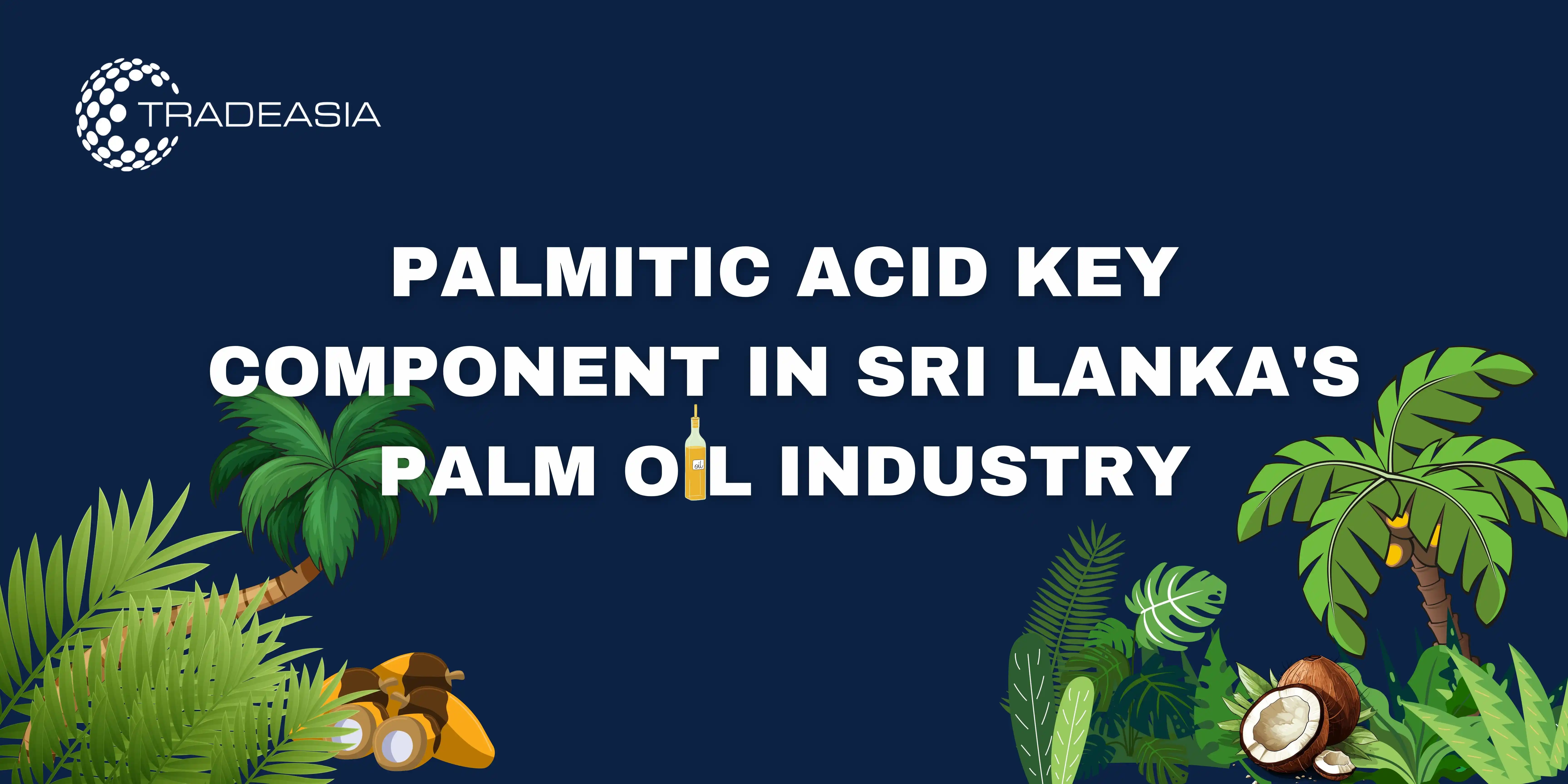Palmitic Acid Key Component in Sri Lanka's Palm Oil Industry

Table of Content
- Overview Palmitic Acid
- Applications of Palmitic Acid in Palm Oil Derivatives
- The Role of Palmitic Acid in Sri Lanka's Palm Oil Industry
- Challenges in Developing Palmitic Acid-Based Products in Sri Lanka
- Strategies for Growth and Sustainability
- Successful Integration of Palmitic Acid in the Cosmetic Industry
- Future Prospects of Palmitic Acid in Sri Lanka
- Conclusion
Palmitic acid, or hexadecanoic acid, is a saturated fatty acid commonly found in palm oil. As one of the most abundant fatty acids in palm oil, it serves as a crucial raw material in a variety of industrial applications. Sri Lanka, with its growing palm oil sector, has significant opportunities to leverage palmitic acid in developing value-added products, particularly in cosmetics, food, and industrial applications. This article delves into the importance of palmitic acid in Sri Lanka's palm oil derivatives industry, examining its applications, economic benefits, and role in sustainable development.
Overview Palmitic Acid
Palmitic acid is a versatile fatty acid with the following characteristics:
-
Chemical Formula: C16H32O2
-
Sources: Primarily derived from palm oil but also found in animal fats and other vegetable oils.
-
Physical Properties: Solid at room temperature with a melting point of approximately 63 °C.
Due to its stability, compatibility, and effectiveness, palmitic acid is widely used in various industries.
Applications of Palmitic Acid in Palm Oil Derivatives
-
Cosmetics and Personal Care Products
Palmitic acid is a key ingredient in many personal care formulations. It provides the following benefits:
-
Acts as an emollient, offering skin-softening properties.
-
Functions as a surfactant in soaps and shampoos, enhancing foam stability.
-
Serves as a stabilizer in creams and lotions, improving product texture.
-
Food Industry
In the food industry, palmitic acid is used for:
-
Texturizing Agents: Enhancing the texture and consistency of margarine, shortening, and baked goods.
-
Preservatives: Increasing shelf life by preventing oxidation in processed foods.
-
Nutritional Applications: Incorporated in infant formula to mimic the fatty acid profile of breast milk.
-
Industrial Applications
Palmitic acid plays a critical role in non-food industries, such as:
-
Lubricants: Enhancing the performance of industrial and automotive lubricants.
-
Candles and Waxes: Acting as a key component in the production of high-quality candles.
-
Plastic Additives: Serving as a processing aid in polymer manufacturing.
-
Pharmaceuticals
Palmitic acid derivatives are used in drug formulations for improved bioavailability and stability.
The Role of Palmitic Acid in Sri Lanka's Palm Oil Industry
-
Economic Growth
Sri Lanka’s palm oil industry can capitalize on palmitic acid’s high demand by focusing on its export potential. Value-added products like soaps, lotions, and specialty fats offer lucrative opportunities for local manufacturers.
-
Sustainability and Circular Economy
By utilizing by-products from palm oil refining, Sri Lanka can promote sustainable practices, reducing waste and creating circular economy models.
-
Innovation in Local Industries
Investing in research and development for palmitic acid-based derivatives can drive innovation in Sri Lanka's chemical, food, and pharmaceutical sectors.
Challenges in Developing Palmitic Acid-Based Products in Sri Lanka
-
Environmental Concerns
Palm oil cultivation has raised concerns about deforestation and biodiversity loss. Sri Lanka must adopt sustainable palm oil production practices to address these issues.
-
Competition from Global Players
Major palm oil producers like Indonesia and Malaysia dominate the market, posing challenges for Sri Lanka’s small-scale industry.
-
Limited Technological Advancements
The lack of advanced processing technologies can hinder the development of high-value palmitic acid derivatives.
Strategies for Growth and Sustainability
-
Adopting Certified Sustainable Palm Oil (CSPO)
Sri Lanka can align its palm oil industry with global sustainability standards, ensuring ethical and environmentally friendly practices.
-
Investing in Research and Development
Government and private sector investments in R&D can foster innovation, creating novel applications for palmitic acid.
-
Building Local Expertise
Training programs for local manufacturers and technicians can enhance expertise in extracting and utilizing palmitic acid efficiently.
-
Leveraging Export Potential
By promoting palmitic acid derivatives in global markets, Sri Lanka can diversify its export portfolio and increase revenue.
Successful Integration of Palmitic Acid in the Cosmetic Industry
A Sri Lankan company specializing in natural skincare products integrated palmitic acid from sustainable palm oil into its formulations. The outcome included:
-
Improved product performance and customer satisfaction.
-
Access to international markets due to adherence to sustainable sourcing practices.
-
Enhanced brand reputation as a sustainable and eco-conscious manufacturer.
Future Prospects of Palmitic Acid in Sri Lanka
-
Expansion into Green Chemistry
Palmitic acid offers potential for developing eco-friendly chemical products, aligning with global trends in green chemistry.
-
Collaborations with Global Partners
Collaborations with international companies can bring technological expertise and market access, boosting Sri Lanka's competitive edge.
-
Focus on High-Value Derivatives
Targeting niche markets such as pharmaceutical-grade palmitic acid and bio-based lubricants can maximize profitability.
-
Public Awareness Campaigns
Educating the public on the benefits of sustainably sourced palm oil derivatives can foster local support for the industry.
Conclusion
Palmitic acid holds immense potential as a cornerstone of Sri Lanka's palm oil derivatives industry. Its versatility and broad applications make it a valuable resource for cosmetics, food, pharmaceuticals, and industrial products. By addressing challenges through sustainable practices, technological advancements, and market diversification, Sri Lanka can position itself as a leader in palmitic acid production. Harnessing this opportunity not only benefits the local economy but also contributes to global sustainability goals, making palmitic acid a key player in the nation’s industrial growth. If you are interested in our products for your specific business needs, please do not hesitate to contact us.

Leave a Comment